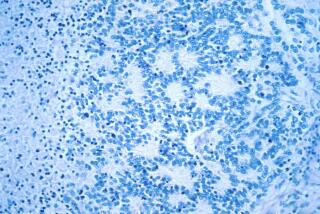New Therapy Gives Hope to Melanoma Patients
- Share via
A new form of cancer immunotherapy may result in a more potent and potentially less toxic treatment for patients with advanced melanoma, a type of skin cancer that can spread throughout the body, government researchers say.
Dr. Steven A. Rosenberg and his colleagues at the National Cancer Institute in Bethesda, Md., reported the preliminary results of their first human tests of the latest variation of immunotherapy using the experimental medicine interleukin-2 in today’s New England Journal of Medicine.
The study involved 20 patients with advanced, otherwise incurable metastatic melanoma. According to the report, the treatment shrank tumors by at least 50% in nine of 15 patients who had never received interleukin-2 before and in two of five patients who had not responded to an earlier version of the therapy.
The responses lasted from two months to more than 13 months. One of the nine patients who responded experienced a disappearance of a measurable tumor. The researchers said, however, that it is too early to tell how the treatment might affect long-term survival.
“These results are preliminary--they are in the right direction--but it’s an experimental approach and one shouldn’t raise unrealistic expectations,” Rosenberg said.
Rosenberg suggested that the approach may be more effective and cause fewer side effects than earlier versions of the therapy.
Other researchers cautioned that the patients Rosenberg treated were probably the most likely to respond, that most of the responses were partial and that the treatment is very difficult to administer.






